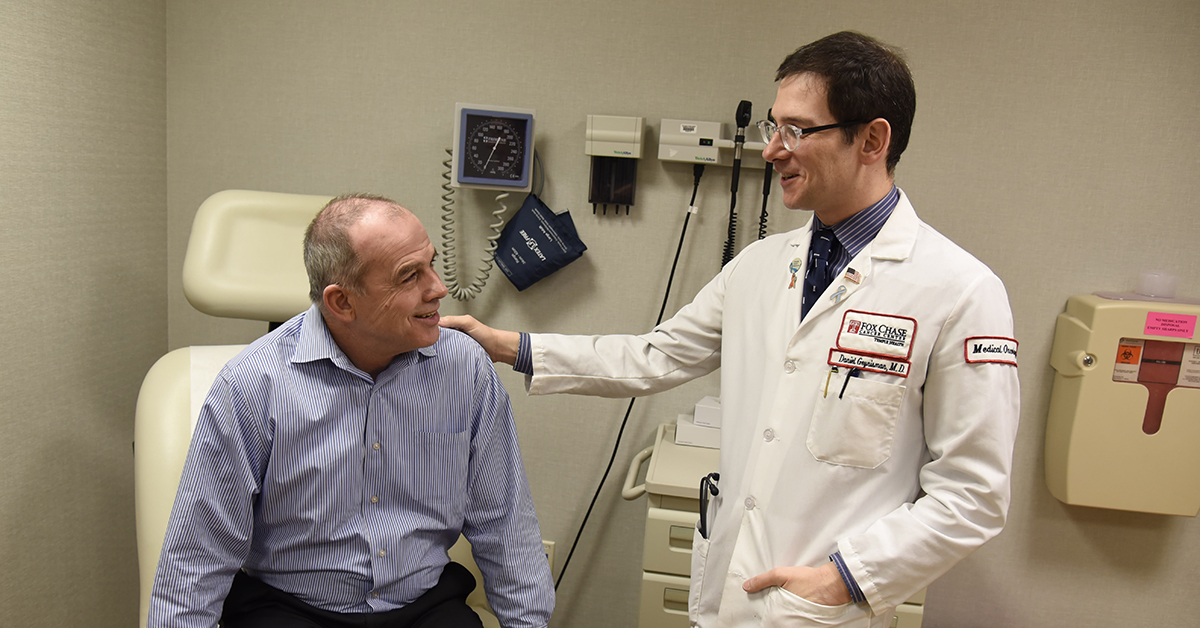
PHILADELPHIA (March 11, 2021)—According to research by Daniel M. Geynisman, MD, associate professor in the Department of Hematology/Oncology at Fox Chase Cancer Center, presented at the American Society of Clinical Oncology’s 2021 Genitourinary Cancers Symposium, some patients with muscle-invasive urothelial carcinoma, a form of bladder cancer, may not need to have their bladder removed.
In an interim analysis of Geynisman’s RETAIN BLADDER trial, 92.3% of patients who were selected to retain their bladders are alive, and 88.5% have not seen their cancer spread.
Currently, the standard of care for patients with muscle-invasive urothelial carcinoma is to treat them with chemotherapy and then surgically remove their bladder or utilize a combination of chemotherapy with radiation. However, for some patients, that initial dose of chemotherapy wipes out the cancer, making the cystectomy, or bladder removal surgery, or radiation to the bladder, unnecessary. The key is identifying who those patients are.
“It’s a big quality of life change to have your bladder removed,” said Geynisman. “If you knew a priori who would have no cancer left behind at the time of the surgery, wouldn’t it be nice to spare them the surgery?”
Geynisman and multiple Fox Chase and external colleagues conducted a phase II clinical trial to try and identify these patients. They recruited 71 muscle-invasive urothelial carcinoma patients from four institutions, of which Fox Chase was one. Following their initial round of chemotherapy, the participants were sorted into an “active surveillance” group and a “standard of care” group.
The 26 active surveillance participants were identified via two criteria: results from their initial tumor biopsies revealed one of four specific genetic mutations, and none of the post-chemotherapy imaging and clinical evaluations of their bladders showed evidence of remaining tumors. These patients did not have a cystectomy and are now being monitored extensively every few months via imaging and other forms of clinical evaluation—hence the designation “active surveillance”—for any evidence of metastasis, or cancer recurrence. If their cancer does recur, they are treated accordingly.
The remaining 45 patients in the standard-of-care group were treated with current standard of care for muscle-invasive urothelial carcinoma: intravesical therapy (drugs administered directly to the bladder), chemoradiation, cystectomy, or some combination of those treatments.
The researchers are following all patients for five years, but the primary endpoint of metastasis-free survival is evaluated at two years. The last patient should hit the two-year mark within the next year. What Geynisman and his team are waiting to see is whether the patient outcomes for the active surveillance group are similar to what they would have been had these patients been treated with standard of care.
“If at the two-year mark for the 71 patients, the survival with no disease is similar to what we would expect if everyone got regular standard of care, but a third of the patients are spared a cystectomy, that’s a win,” said Geynisman.
According to interim results he presented at the conference, the outlook is encouraging. More than three quarters of patients on active surveillance are alive without metastatic disease and with their bladder intact. These data suggest that a proportion of patients can retain their bladder and preserve quality of life without compromising oncologic outcomes.